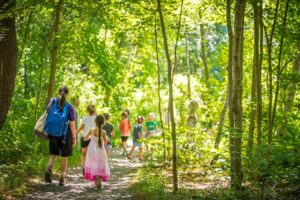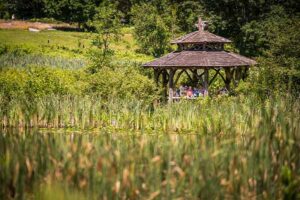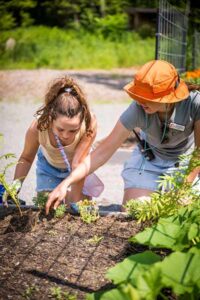 By Holly Snow, Manager of Youth Education
By Holly Snow, Manager of Youth Education
September 2025
Every year, schools from across the state visit New England Botanic Garden for field trips that allow students to immerse themselves in nature and learn about the plants and animals that call our gardens and the surrounding environment home. Our youth education programs serve students from Pre-K through high school, and each of our twelve guided programs are designed to connect directly with Massachusetts science standards. Children engage in hands-on, minds-on learning in our outdoor classroom.
Teachers consistently share how meaningful these experiences are for their students, many of whom rarely have opportunities to connect with the natural world. We often hear comments about how special it is to watch students activate their senses, explore with hand lenses, and encounter wildlife in this new environment.
The goal of our Youth Education programs is to welcome as many students as possible for unforgettable learning experiences. However, one of the most significant barriers for schools is transportation to the Garden. School administrators and teachers tell us that busing is their biggest expense for field trips, sometimes so costly that they have no choice but to replace off-site programs with “in-house” field trips. But it’s hard to replicate an immersive experience in nature while inside the classroom.
 To help schools overcome this challenge the Garden recently initiated the Barbara’s Bus Fund, a fund that provides financial assistance to select schools to pay for busing costs from their school to the Garden. Barbara’s Bus Fund was named in honor of the late Barbara Morse, a former trustee and long-time supporter of the Garden. Barbara had a passion for inspiring the next generation of environmental stewards and this fund continues her legacy by helping bring students here.
To help schools overcome this challenge the Garden recently initiated the Barbara’s Bus Fund, a fund that provides financial assistance to select schools to pay for busing costs from their school to the Garden. Barbara’s Bus Fund was named in honor of the late Barbara Morse, a former trustee and long-time supporter of the Garden. Barbara had a passion for inspiring the next generation of environmental stewards and this fund continues her legacy by helping bring students here.
The fund is available to all Title I schools—federally recognized schools where at least 40 percent of the student population comes from low-income households. Often, these schools don’t have budgets for field trip buses. Neither do they own their own bus fleet. They contract with external providers for busing and costs can vary by company and travel distance. To put it into perspective, transporting a single grade-level group, typically 48 to 200 students, costs between $400 and $2,500. Since its launch in May 2024, the Barbara’s Bus Fund has already provided over $10,000 in transportation support, making it possible for 1,000 students to visit the Garden.
 Schools register for a field trip to the Garden to give their students engaging educational experiences. When students arrive, they embark on a 90-minute guided hike tailored to their grade and what they are studying. First graders might explore the seasons and weather patterns, fifth graders dive into photosynthesis, and middle schoolers discover plant and animal relationships in our ecosystem. These trips go beyond the textbooks to give students tangible and memorable experiences. And they aren’t just strengthening their academic understanding. They are also improving their health and wellness just by being active outside. Experiencing the Garden through a field trip is so important for our students. They are forming personal connections with the environment—connections that could foster a lifelong respect for nature.
Schools register for a field trip to the Garden to give their students engaging educational experiences. When students arrive, they embark on a 90-minute guided hike tailored to their grade and what they are studying. First graders might explore the seasons and weather patterns, fifth graders dive into photosynthesis, and middle schoolers discover plant and animal relationships in our ecosystem. These trips go beyond the textbooks to give students tangible and memorable experiences. And they aren’t just strengthening their academic understanding. They are also improving their health and wellness just by being active outside. Experiencing the Garden through a field trip is so important for our students. They are forming personal connections with the environment—connections that could foster a lifelong respect for nature.
For me, one of the most rewarding parts of working on the youth education team is seeing students faces light up as they come across wildlife on the trails. They are so excited to be immersed in the gardens, and I often hear students say, “I want to work here when I grow up.” A lot of our students come from inner city schools where fields are replaced by pavement, trees are sparce, and wildlife is limited. When they get here, teachers are in awe of how their kids are experiencing this environment—they are more engaged and curious because they are exploring nature first-hand.
As they hike the trails and explore our gardens, students may watch a snake slither through the grass, frogs sunning on lily pads, wild turkeys grazing, and bees hard at work collecting nectar. Core memories are being formed for students, and we are happy that the Garden can help cultivate these learning experiences.
The Barbara’s Bus Fund helps ensure that students—regardless of distance or school system—can discover the wonder of the Garden, make connections with nature, and perhaps become the next generation of environmental stewards. If you would like to help us eliminate financial barriers to education, please consider supporting the Barbara’s Bus Fund. Your gift directly funds transportation for schools in need, opening the door for thousands of students to connect with nature in meaningful and lasting ways.
About the Author
Holly Snow is the Manager of Youth Education at New England Botanic Garden at Tower Hill located in Boylston, MA. She has been with the organization since 2021 and is responsible for overseeing programs that engage youth and their families in nature-based art and science programs. Holly earned her MS in Museum Studies from Johns Hopkins University and a BS in Art Education from the University of Vermont.
